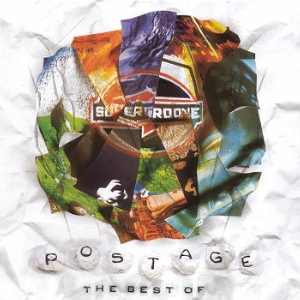The music of Niue has a long history. Niue is a Polynesian island in the South Pacific. Though independent, it is in free association with New Zealand.
New Zealand hip hop derives from the wider hip hop cultural movement originating amongst African Americans in the United States. Like the parent movement, New Zealand hip hop consists of four parts: rapping, DJing, graffiti art and breakdancing. The first element of hip hop to reach New Zealand was breakdancing, which gained notoriety after the release of the 1979 movie The Warriors. The first hip hop hit single, "Rapper's Delight" by the Sugarhill Gang, became a hit in New Zealand when it was released there in 1980, a year after it was released in the United States. By the middle of the 1980s, breakdancing and graffiti art were established in urban areas like Wellington and Christchurch. By the early 1990s, hip hop became a part of mainstream New Zealand culture.
Supergroove is a New Zealand funk rock music group. Their debut album Traction was released in 1994. The group disbanded in 1997 but reformed in 2007.
Matakite John Chong Nee, better known by his stage name Chong Nee, is a New Zealand hip hop and R&B singer-songwriter and producer.

Conscious Roots was released in 2004. The album is the 1st edition of the (NZ) series.

2b S.Pacific is the debut solo album by New Zealand musician Che Fu. Released through BMG in October 1998, it reached No. 2 on the New Zealand charts.
Tigilau Ness is a Niuean New Zealand activist and reggae artist, and performs as Unity Pacific. Ness is a political activist and first generation Pacific Island New Zealander.

Bill Rangi Urale, known by his stage name King Kapisi, is a New Zealand hip hop recording artist. He was the first hip hop artist in New Zealand to receive the Silver Scroll Award at the APRA Awards for Songwriter of the Year for his single Reverse Resistance in 1999.

Traction is the first album by New Zealand rock band Supergroove. It was released in 1994 by RCA Records, debuting at number one on the New Zealand albums chart and quickly reached platinum status there.[2] Before the band could record their second album, Che Fu was fired from the band. Supergroove would end up releasing their second and final album, Backspacer, without Fu. To date, the album has achieved the requirements for platinum status five times over.[3]
DLT or Darryl Leigh Thomson, is a New Zealand hip hop DJ, music producer and composer as well as a visual artist. He was a founding member of Upper Hutt Posse (UHP). As a solo artist DLT issued two albums, The True School (1996) and Altruism (2000) – both peaked on the New Zealand albums chart top 20. His most successful single, "Chains" (1996), featuring vocals by Che Fu, reached number one on the New Zealand singles chart.

Dane Aaron Rumble is a New Zealand recording artist. He is a former member of New Zealand hip hop group, Fast Crew.
Kas Futialo, known by the stage name Tha Feelstyle, is a New Zealand hip hop artist of Samoan descent. His first album was Break It To Pieces in 2004. Tha Feelstyle was born in Samoa and moved to New Zealand in the 1980s. He raps in English as well as the Samoan language.

Postage is a greatest hits album by the New Zealand funk rock band Supergroove, released in 2003. In addition to the band's biggest hits, there are a number of songs on the album, predominantly from singles, which had not been previously released on any of the band's earlier albums and EPs. Noticeable inclusions are "Sex Police", "Here Comes the Supergroove", and a new remix by New Zealand hip hop producer P-Money. The album entered the charts at number 10, and was certified gold one week after its release.

Vaosa ole Tagaloa Makerita Urale is a documentary director and playwright, and a leading figure in contemporary Polynesian theatre in New Zealand. She has produced landmark productions in the performing arts. She is the writer of the play Frangipani Perfume, the first Pacific play written by a woman for an all-female cast. Working in different art mediums, Urale also works in film and television. She is the director of the political documentary Children of the Revolution that won the Qantas Award (2008) for Best Māori Programme.

"Sensitive to a Smile" is a single from the New Zealand reggae band Herbs from the Sensitive to a Smile album. The single reached #9 in the New Zealand chart.

"Chains" is a hip hop song by New Zealand DJ DLT featuring singer Che Fu. The song reached number one on the New Zealand charts. It was Che-Fu's first song after leaving Supergroove and marked the beginning of his solo career.

Ria Hall is a Māori recording artist, singer-songwriter, television presenter, and political candidate. She has released two solo albums, Rules of Engagement (2017), which topped the Official New Zealand Music Chart shortly after its release, and Manawa Wera (2020). Her work reflects Māori society and history, and Hall regularly sings in Māori as well as English.
The 2014 New Zealand Music Awards was the 49th holding of the annual ceremony featuring awards for musical recording artists based in or originating from New Zealand. It took place on 20 November 2014 at Vector Arena in Auckland. The awards show was screened on channel Four, the first time the event was broadcast live.

"Can't Get Enough" is a 1994 single from New Zealand funk rock band Supergroove. It peaked at number one in the New Zealand singles chart and later charted at 36 in Australia. The song was included on Supergroove's debut album Traction. Long-time TVNZ 2 continuity announcer Warren Thomas made a spoken cameo appearance part way into the song.
The 2017 New Zealand Music Awards was the 52nd holding of the annual ceremony featuring awards for musical recording artists based in or originating from New Zealand. It took place on 16 November 2017 at Spark Arena in Auckland and it was hosted by Jono Pryor and Ben Boyce. The awards show was broadcast live nationally on Three.













